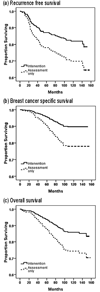Psychologic intervention improves survival for breast cancer patients: a randomized clinical trial
- PMID: 19016270
- PMCID: PMC2661422
- DOI: 10.1002/cncr.23969
Psychologic intervention improves survival for breast cancer patients: a randomized clinical trial
Abstract
Background: The question of whether stress poses a risk for cancer progression has been difficult to answer. A randomized clinical trial tested the hypothesis that cancer patients coping with their recent diagnosis but receiving a psychologic intervention would have improved survival compared with patients who were only assessed.
Methods: A total of 227 patients who were surgically treated for regional breast cancer participated. Before beginning adjuvant cancer therapies, patients were assessed with psychologic and behavioral measures and had a health evaluation, and a 60-mL blood sample was drawn. Patients were randomized to Psychologic Intervention plus assessment or Assessment only study arms. The intervention was psychologist led; conducted in small groups; and included strategies to reduce stress, improve mood, alter health behaviors, and maintain adherence to cancer treatment and care. Earlier articles demonstrated that, compared with the Assessment arm, the Intervention arm improved across all of the latter secondary outcomes. Immunity was also enhanced.
Results: After a median of 11 years of follow-up, disease recurrence was reported to occur in 62 of 212 (29%) women and death was reported for 54 of 227 (24%) women. Using Cox proportional hazards analysis, multivariate comparison of survival was conducted. As predicted, patients in the Intervention arm were found to have a reduced risk of breast cancer recurrence (hazards ratio [HR] of 0.55; P = .034) and death from breast cancer (HR of 0.44; P = .016) compared with patients in the Assessment only arm. Follow-up analyses also demonstrated that Intervention patients had a reduced risk of death from all causes (HR of 0.51; P = .028).
Conclusions: Psychologic interventions as delivered and studied here can improve survival.
Figures



Comment in
-
Psychosocial interventions in breast cancer: to light a candle.Cancer. 2009 Dec 15;115(24):5617-9. doi: 10.1002/cncr.24659. Cancer. 2009. PMID: 19824082 No abstract available.
-
Finding what is not there: unwarranted claims of an effect of psychosocial intervention on recurrence and survival.Cancer. 2009 Dec 15;115(24):5612-6. doi: 10.1002/cncr.24671. Cancer. 2009. PMID: 19834959
References
-
- Chida Y, Hamer M, Wardle J, Steptoe A. Do stress-related psychological factors contribute to cancer incidence and survival? Nat Clin Pract Oncol. 2008;5:466–475. - PubMed
-
- Dhabhar FS, McEwen BS. Bi-directional effects of stress on immune function: Possible explanations for salubrious as well as harmful effects. In: Ader R, editor. Psychoneuroimmunology. New York, NY: Elsevier; 2007. pp. 723–760.
Publication types
MeSH terms
Grants and funding
LinkOut - more resources
Full Text Sources
Other Literature Sources
Medical
Research Materials

